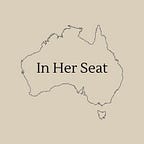Diane Evers: For inclusion
“I had the opportunity, the skills, and the values that were needed”
Almost 100 years ago, Edith Cowan became the first woman elected to an Australian parliament, in March 1921.
In Her Seat is asking as many currently serving female politicians as we can how they view gender equality, politics and their impact.
This is a non-partisan project that is soliciting contributions from women in all parties, or none at all, in every parliament.
Diane Evers is Member for South West Region in the Legislative Council of the Western Australian Parliament. She was elected at the 2017 election.
Born in Chicago, Illinois, Diane trained as an accountant and has lived in Australia since 1984. Prior to entering Parliament, she was the State Manager of Green Skills, a community organisation undertaking environmental works and community development leading toward sustainable lifestyles.
Diane also served as an inaugural Councillor of the newly formed City of Albany Council, Diane held Board positions on the Great Southern Development Commission, the Albany Chamber of Commerce and Industry, Wilson Inlet Catchment Committee.
Diane has taken a keen interest in issues like government transparency and accountability, sustainable development, genetically modified crops, social issues, marine reserves and renewable energy.
What does gender equality mean to you?
Gender equity occurs when there is no discrimination based on gender. Ideally, all people would have the opportunity to be their best, regardless of birth, gender, abilities, skin colour, etc.
Being at their best mental and physical health, with activities and opportunities that connect them in a positive way with others.
Which female politicians have inspired or encouraged you?
I suppose Julia Gillard for calling it out, when she saw discrimination occurring.
Discrimination was such an accepted part of our culture, and her speech was a turning point.
From then on in Australia, it became the responsibility of women to speak out for themselves and others when they heard comments or witnessed actions that diminished females as a gender.
What inspired you to serve your community?
I had the opportunity, the skills, and the values that were needed.
It would be remiss of me to waste this.
I have considerable privilege due to my birth and the choices I have made through my life, I had the resources for myself and my family, and it was time to share. In addition, it seemed that the voices for people and the planet were not being heard.
What are the most important contributions you are making in Parliament?
Amplifying the voices and concerns of people who share the values, expectations and visions of Greens principles with regard to ecology, peace and justice.
Dragging the government toward a more inclusive governance process by normalising the words collaborative and deliberative.
Governance must be inclusive in order to have solutions, laws and a way forward that can be accepted by and benefit everyone.
What is next for gender equality in politics?
It seems to me that the generation born from 1995 or so onward are not set on dividing the world in a binary system.
Gender, sexuality, race, religion, possibly even sporting teams, are not separated into us and them. Politics may become no different.
Many countries already have multi-party democracies, some for over 100 years.
Our electoral system needs change where electors can vote for people with good values who are beholden to their communities and not the party line, particularly when that party line is determined by the influence and self-interest of only a few.
In Her Seat interviews can be accessed here
